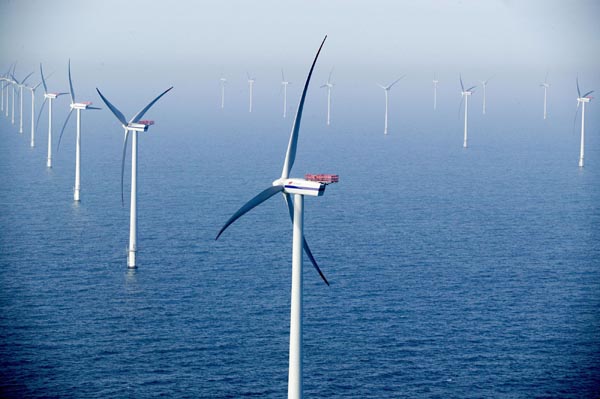
A new set of long-term gas purchase agreements and associated hedging arrangements that share the risk of future price changes among natural gas suppliers, power generators, and consumers—combined with a level, nondiscriminatory playing field for regulatory review and approval—could potentially lock in tens of billions of dollars of savings for the future gas power market. That’s the conclusion of a new report, “Power Switch: A No Regrets Guide to Expanding Natural Gas-Fired Electricity Generation,” from the American Clean Skies Foundation.
The current natural gas supply glut has brought gas prices to inflation-adjusted record lows and spurred unprecedented shifts toward gas-fired power. This, the report warns, has created both great potential and great risk, as the move to shed coal-fired generation depends on gas prices remaining at profitable levels. But a return to the higher gas prices seen in the late 2000s could saddle plant owners with crippling financial problems, all the more so because the current regulatory regime is heavily biased toward gas purchases on the spot market—even though long-term purchase agreements for coal and renewable power are common.
Carpe Diem?
The authors lay out the issues at stake: “the U.S. electric power industry has a historic opportunity to deliver cleaner and cheaper gas-fired power to the public for years, if not decades, to come. This opportunity will not be realized, however, unless all the major stakeholders—suppliers, generators, pipelines, utility commissioners, and consumers—work together to put in place a viable framework to support the wider use of longer term gas supply contracts.”
The study points out that there is substantial underutilized gas-fired capacity in the U.S., even with the record gas burn the country has seen this summer. Last year, about 118 GW of U.S. combined cycle gas turbine plants operated at less than 50% capacity. While that figure has fallen this year, it has by no means been eliminated. That suggests that locking in low gas prices could offer the opportunity to reduce generating costs substantially over the long term, but little effort has been expended to do so.
Three reasons are identified for why this is the case:
- Loss aversion and status quo bias on the part of generators and gas suppliers.
- A lack of regulatory incentives for generators to shoulder fuel price risks in the electric sector.
- Asymmetrical regulation of fuel contracts for electric generating facilities.
With respect to the first, utilities have not forgotten the historic volatility in gas prices, and they fear locking themselves into gas-fired generation. Likewise, gas suppliers see little benefit in locking in low prices and thus losing the opportunity to seller higher later.
Regulatory Inertia
The second and third factors stem from the historic tendency of regulators to hold utilities responsible for bad bets on fuel prices while forcing them to pass on gains from good bets to their ratepayers. This leaves the utilities with no incentive buy gas outside the spot market. As an AEP spokesman was quoted as saying in the study, “All the penalties are ours if we hedge and we are wrong, and there is no benefit when we are right. As a result, we go with the spot market.”
“The intent is to protect ratepayers from imprudent forward purchases in volatile markets,” the report notes. “However, the end result is also to discourage forward thinking—an outcome that is just as likely or more likely to penalize ratepayers—when markets reach historic lows, as is currently the case.”
This is notably in contrast to coal and renewables, where long-term contracts are both encouraged and common.
So what to do? The study authors do not advocate an immediate shift to long-term supply contracts for gas, partly because this offers no clear benefit for gas suppliers. Rather, they suggest a hybrid approach that involves both fixed and market prices.
Under such a contract, the parties would agree to price 50% of the gas at a fixed price and 50% at the current market price. This insulates both parties from volatility in the market without locking them into a single price that may prove to be dangerously uneconomic for one of the parties. “Ultimately, a hybrid contract that blends fixed and market prices offers a risk-sharing mechanism that should be attractive to electric generators and gas suppliers alike.”
No Regrets
This approach is termed “no regrets” by the authors because it is designed to allow the parties to share risk in an equitable manner. Both give up the chance for a “big win” should prices change dramatically, but they also limit the risk of being burned by a bad bet.
All of this, however, depends on a supportive regulatory regime. Two states, Colorado and Oklahoma, have begun developing such a structure. In Oklahoma, as long as the contracts are secured through “an open, transparent, fair and nondiscriminatory competitive bidding process,” they enjoy a presumption of prudence that discourages regulators from later second-guessing the decisions. Utilities still have the option to enter supply contracts outside the process if they choose, but these will not enjoy the presumption.
The study offers four recommendations for regulators:
- Regulators should reconsider the practice of preapproving standard fuel-cost pass-through arrangements.
- State regulators need to provide a level playing field for all fuels and resources by developing defined procedures for competitive procurement.
- The regulatory review process should be expedited and also should be flexible enough to allow parties to update bids if market conditions change quickly.
- An independent evaluator should participate in the process to ensure customers are receiving the best deal possible.
“With a foundation of regulatory acceptance,” the authors suggest, “gas suppliers and electricity generators can develop simple, innovative, and mutually beneficial agreements.”
Finally, the study notes that pipeline operators need to be part of the process. Any long-term supply agreement should be matched by an equal commitment to the pipeline operators who will be supporting it, typically with a firm transportation agreement.
The authors conclude, “Creating the regulatory and policy environment needed to support [long-term risk-sharing] agreements will do much to lay the foundation for a smooth transition to a more flexible, clean and affordable electricity supply.”
Whether the nation’s generators, gas suppliers, and regulators will heed this call remains to be seen.
—Thomas W. Overton, JD is POWER’s gas technology editor. Follow Tom on Twitter @thomas_overton.










